 Petzlover
Petzlover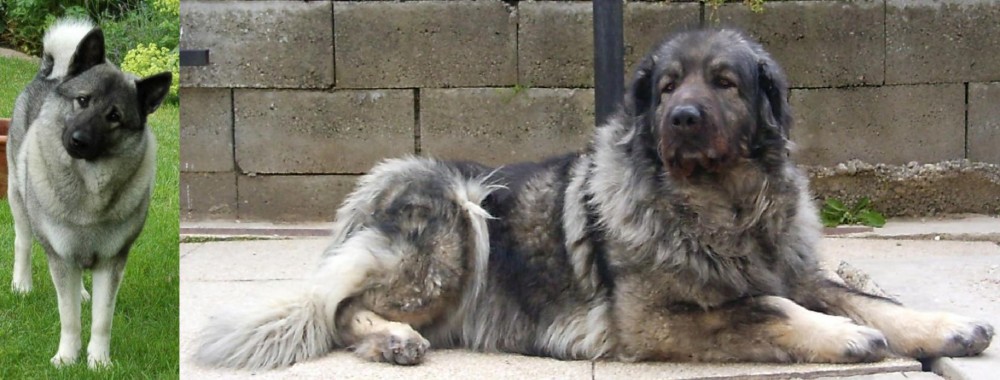 Norwegian Elkhound is originated from Norway but Sarplaninac is originated from Macedonia. Norwegian Elkhound may grow 7 cm / 2 inches shorter than Sarplaninac. Norwegian Elkhound may weigh 20 kg / 44 pounds lesser than Sarplaninac. Both Norwegian Elkhound and Sarplaninac has almost same life span. Both Norwegian Elkhound and Sarplaninac has almost same litter size. Both Norwegian Elkhound and Sarplaninac requires Moderate Maintenance.
Norwegian Elkhound is originated from Norway but Sarplaninac is originated from Macedonia. Norwegian Elkhound may grow 7 cm / 2 inches shorter than Sarplaninac. Norwegian Elkhound may weigh 20 kg / 44 pounds lesser than Sarplaninac. Both Norwegian Elkhound and Sarplaninac has almost same life span. Both Norwegian Elkhound and Sarplaninac has almost same litter size. Both Norwegian Elkhound and Sarplaninac requires Moderate Maintenance.
 The Norwegian Elkhound is an ancient spitz-type dog breed hailing from Norway and with a history that goes back thousands of years.
The Norwegian Elkhound is an ancient spitz-type dog breed hailing from Norway and with a history that goes back thousands of years.
These dogs have been used as hunting dogs and have been able to bring down game such as Elk, bears, wolves, badgers and reindeer. They have also been used to guard livestock.
The Norwegian Elkhound was recognized by the American Kennel Club in 1913.
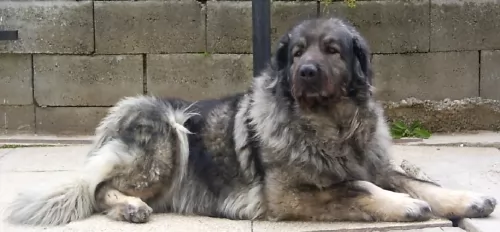 Hailing from Macedonia, the beautiful Sarplaninac dog was developed as a guardian of livestock and is large enough to fight off large predators like bears and wolves.
Hailing from Macedonia, the beautiful Sarplaninac dog was developed as a guardian of livestock and is large enough to fight off large predators like bears and wolves.
Nobody is too sure of the breeds exact origins, though it is thought that its ancestors came to the Balkan Peninsula with people migrating from ancient Asia.
This huge dog is one of the oldest native breeds from ancient Molosser breeds. The dog was recognized in 1939, and in 1954 it became known as the Yugoslav Shepherd Dog. Later the name changed and the dog was recognized by the United Kennel Club in 1995.
 The Norwegian Elkhound is a medium to large sized dog standing at roughly 45 to 55cm in height and weighing anything fro 18 to 25 kilogams.
The Norwegian Elkhound is a medium to large sized dog standing at roughly 45 to 55cm in height and weighing anything fro 18 to 25 kilogams.
People love this dog because of his beautiful wolf-like face and bright eyes. The head is broad and wedge-shaped, the eyes dark brown, the ears stand erect and the bush tail curls over the dog's back.
The double coat has different shades of gray and silver with cream and white shades on the undercoat.
He is a moderate shedder with some seasonal shedding.
The Norwegian Elkhound is a high energy dog who loves to be busy and he also makes a loving and loyal companion towards his human family. He tends to be a little bit reserved around strangers.
He is an independent dog so so its a good idea to have him trained and socialized so that he is always obedient. He is an intelligent dog so you won’t battle to teach him.
He gets on well with children in the home. He however, can be a little bit aggressive with other dogs, but not if he was brought up with them as a puppy. Adventurous and active, he just loves spending time outdoors. It's why he is best suited to life in the countryside as opposed to the city and also prefers cooler climates.
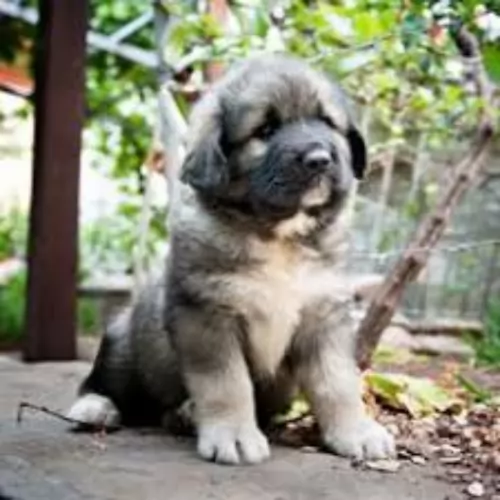 The Sarplaninac is a large, strong, fluffy dog standing at between 54 and 62cm in height and weighing between 30 and 45kg.
The Sarplaninac is a large, strong, fluffy dog standing at between 54 and 62cm in height and weighing between 30 and 45kg.
The coat of the dog is dense, coarse and of medium length. Colors are different shades of grey, white, tan and black. The head is large, the ears are fairly short but are floppy and covered with short hair. The dog is deep chested and the tail is long, often held high and covered with thick, feathery hair.
Protective, reliable, reserved, stubborn and gentle, this intelligent dog is fairly serious, and while he makes a devoted family pet, he is cool and wary of strangers.
Excellent training and socialization makes him well mannered, balanced and obedient around different people. He will tolerate children but won’t take easily to other pets in the house, capable of becoming aggressive with them.
 Your Norwegian Elkhound makes an awesome pet. He is full of the joys of living and wants to be an active member of his human family.
Your Norwegian Elkhound makes an awesome pet. He is full of the joys of living and wants to be an active member of his human family.
He is active and always ready for some fun and games. He is also intelligent and will make an even better pet when he has been trained and socialized.
Those who have owned one of these beautiful dogs will always say how they adore this beautiful, smart, loving canine friend of theirs.
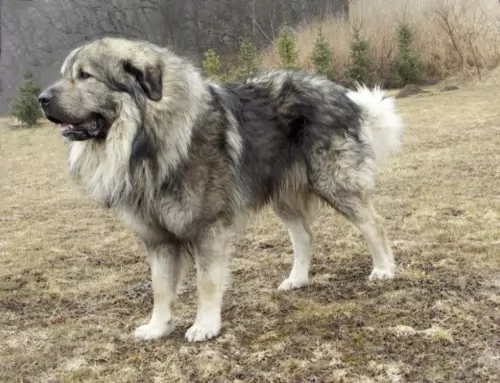 These dogs are protective, but they’re not vicious. When properly raised they are wonderful family pets.
These dogs are protective, but they’re not vicious. When properly raised they are wonderful family pets.
True, it’s a large, strong willed dog that isn’t a good choice for the first-time dog owner. They are good with children, but only children who have been taught how to treat animals with care and patience.
This dog is a powerful guardian type of dog, imposing in size, but it’s all about upbringing, and if you bring him up well then he can make a tremendous pet and companion.
 Your beautiful Norwegian Elkhound can reach 15 years of age if you look after him well and he manages to avoid some of the common dog diseases there are.
Your beautiful Norwegian Elkhound can reach 15 years of age if you look after him well and he manages to avoid some of the common dog diseases there are.
There are some dog illnesses that are good to be aware of -
This is an eye condition where there is pressure that builds up in the eye. There is a problem with the drainage of fluid in the eye and this is what causes the pressure and there can be damage to the optic nerve.
This is a skin condition that causes inflammation and is often seen in dogs like the Norwegian Elkhound who have thick coats.
A common disease seen in many dog breeds, young and old, and which is a malfunction of the hip joints, causing problems with your dog’s mobility.
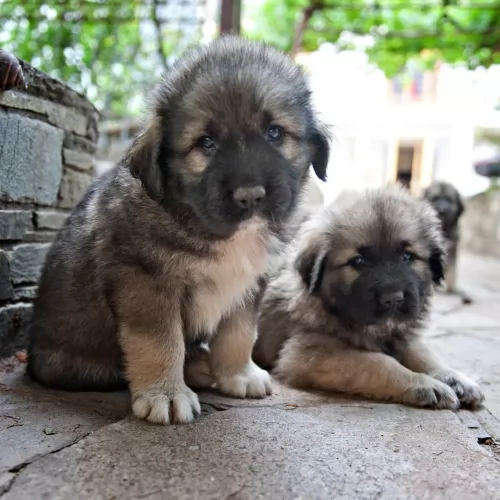 The Sarplaninac dog is a robust dog but he can suffer from health issues such as hip dysplasia, obesity, bloat, ear infections and skin allergies.
The Sarplaninac dog is a robust dog but he can suffer from health issues such as hip dysplasia, obesity, bloat, ear infections and skin allergies.
When your dog gazes up at you with such love in his eyes, don’t be tempted to pop some chocolate into his mouth or let him finish off your ice-cream. Treats like this can damage your pet’s health and give him heat intolerance, breathing difficulties, hypertension, liver disease and diabetes.
 As a spitz type dog, the Norwegian Elkhound is an energetic dog who will need lots of physical activity.
As a spitz type dog, the Norwegian Elkhound is an energetic dog who will need lots of physical activity.
He has a very thick coat so make sure he doesn’t overheat during exercise as he has been used to living in wintry climates.
Your pet will shed some of that thick hair so he will need to be brushed at least twice a week to keep the coat in tip top condition. At the same time check him over for ticks and fleas. How often you see ticks on your dog will depend on where you live. These parasites attach to your dog and feed on his blood.They are capable of causing many diseases in your pet, one of which is Lyme disease, a disease which can lead to arthritis and swelling with your dog’s joints.
The best way to prevent any disease from weakening your pet is to get him to the vet as soon as possible. A good way to prevent ticks is to speak to your vet about tick control products.
Make sure he has the best food to ensure health and happiness. Keep his meals simple – no exotic, spicy foods that can upset his stomach.
A high quality kibble brand for energetic dogs is a wise choice and some tasty home-made food added in occasionally. This can be boiled chicken, brown rice and vegetables. Never leave him without a constant supply of fresh, cool water.
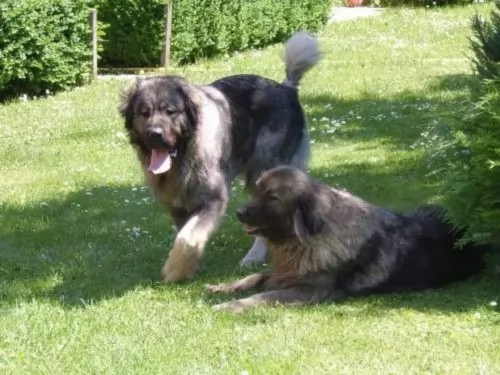 Every dog needs care from puppyhood through to old age.
Every dog needs care from puppyhood through to old age.
Šarplaninacs are looked upon as medium maintenance dogs. The coat is long and thick and requires a firm bristle brush to get their hair brushed.These dogs are moderate shedders so a brush twice a week will do the trick to keep the hair free of loose hair and matting.
Because these dogs have floppy ears, they will need to be checked and cleaned. Floppy eared dogs battle with moisture and wax build-up that increases the likelihood of ear infections.
Check the eyes that they are clear and free of discharge. Eyes with a lot of discharge can be indicative of health problems.
Check for any unusual lumps as cancer often starts with a new lump.
Provide your pet with a nice warm, dry place to sleep.
Keep his vaccines up to date to prevent deadly canine diseases.
Have him or her spayed or neutered if you don’t want puppies. These are regular procedures for a vet and offers health benefits for the dog. Neutering a male improves his character and keeps him from roaming. These dogs are capable of having 3 – 8 puppies.
The Sarplaninac requires decent food if he is to remain healthy. Dog’s stomachs can become upset if they eat all kinds of sweet and spicy human foods.
Commercially manufactured dog food is a good backup food to have because of its convenience. Try to include some home-made food. Simply add into one big pot chicken, brown rice or pasta and spinach, sweet potatoes and carrots. This food can all be chopped up and added in to the dry kibble twice a week. Give this to your pet twice a week and see how his tails wags when he smells it.
Also try to add in some raw meat to his food occasionally.
Ensure there is always a bowl of fresh, cool water within his reach.